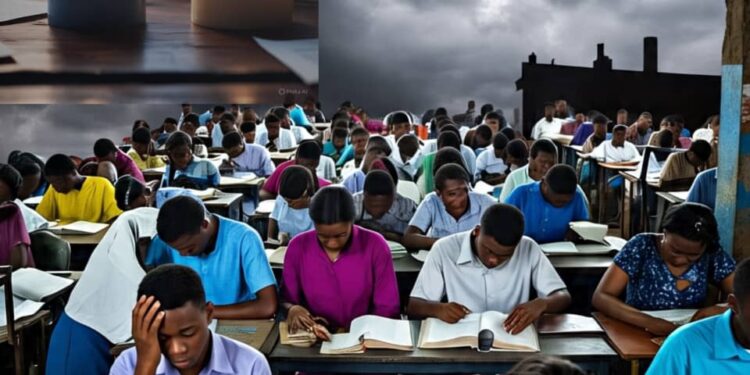The state of Nigeria’s educational system is a cause for concern, with recent events highlighting the need for urgent reforms. The West African Examinations Council (WAEC) and the Joint Admissions and Matriculation Board (JAMB) have faced criticism for their handling of examinations, revealing deep-seated issues that threaten the credibility of the system.

The WAEC 2025 Senior Secondary School Certificate Examination was marred by controversy, with students forced to sit for exams under deplorable conditions. Reports emerged of students taking exams in the dark, using candles and torchlights to illuminate their surroundings. This unacceptable situation has sparked outrage among stakeholders, including parents, teachers, and policymakers.
The House of Representatives Committee on Basic Education and Examination Bodies slammed WAEC’s management, citing systemic lapses and operational failures. Committee Chairman Oforji Oboku described the situation as “unacceptable” and “a failure of leadership”. The committee’s investigation revealed that WAEC’s management failed to provide adequate infrastructure and support for the examination, leading to the chaotic situation.

JAMB has also faced challenges, with reports of digital examination malpractices rocking the Unified Tertiary Matriculation Examination (UTME). The board’s registrar, Professor Ishaq Oloyede, revealed that some Computer-Based Test (CBT) centers and school owners collaborated to hack into the system, compromising the integrity of the examination. Over 3,000 candidates have been identified as beneficiaries or accomplices in these malpractices.


The JAMB incident highlights the vulnerability of the examination system to technological manipulation. It also raises questions about the effectiveness of the board’s security measures and the integrity of the examination process.
The current state of affairs highlights the need for total reform in Nigeria’s educational system. The WAEC and JAMB incidents demonstrate a lack of preparedness, inadequate infrastructure, and ineffective management. To restore credibility and dignity to the system, urgent action is required.

WAEC and JAMB need to invest in modern infrastructure to support their operations, including CBT centers and secure examination facilities. Strong leadership and management are essential to prevent systemic lapses and operational failures. Examination bodies must prioritize transparency and accountability, ensuring that candidates are treated fairly and results are credible. A national education summit is necessary to assess the state of secondary school infrastructure and develop strategies for improvement.

Nigeria’s educational system is facing significant challenges, and urgent reforms are needed to restore its credibility. By addressing the issues plaguing WAEC and JAMB, Nigeria can ensure a brighter future for its students and the nation as a whole. The government, examination bodies, and stakeholders must work together to implement reforms that prioritize transparency, accountability, and infrastructure development. Only then can Nigeria’s educational system regain its credibility and provide opportunities for its citizens to succeed.
Bashorun Industreet Saintabey is a socio – philosopher, author, reformer, coach and public policy expert, a seasoned academia who loves to write about social related and contemporary issues.


You can get every of our news as soon as they drop on WhatsApp ...To get all news updates, Join our WhatsApp Group (Click Here)
















